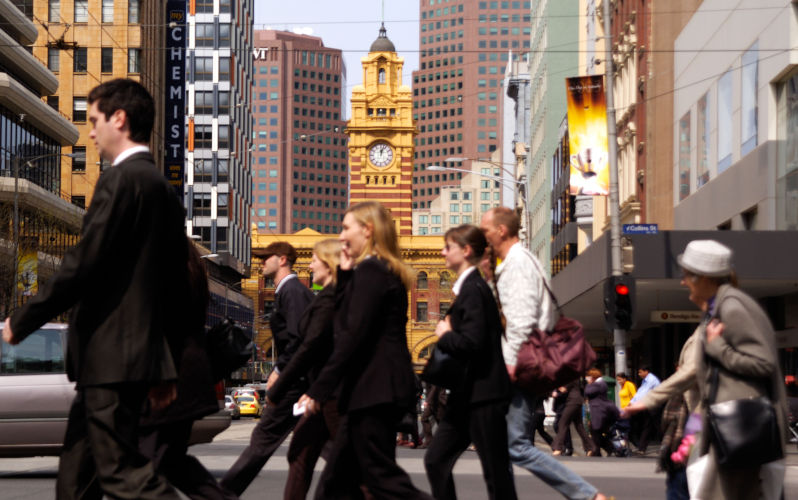Democracy in the City of Melbourne: Some voters are more equal than others
June 14, 2025
Now that the dust has settled on the 2024 City of Melbourne council elections, what lessons can be learned?
I stood for deputy lord mayor and lost, but I gained insight into Melbourne’s curious electoral system. Unlike any other local council in Australia, Melbourne’s voting system is a freak: businesses (including landlords) get two votes, while residents only get one.
This double vote for corporations is unnecessary. It’s like letting the corporate boxes at the MCG dictate the rules of the game while passionate fans in the Great Southern Stand only get a minor say. The imbalance was a live issue in the 2024 election. Candidates across the political spectrum called out the unfairness of the corporate double vote.
While business and property owners are over-represented, there is a clear lack of voting rights for city workers. These workers are discussed in policy, especially when it comes to “ getting them back to the office”, but they are excluded from having a say in what kind of city they work in.
City workers — not just office staff, but hospitality workers, cleaners, shop assistants, and more — should arguably have a voice in shaping the city’s future. Yet they are effectively invisible in the voting system.
Giving city workers the vote would have two main benefits:
- Employers may have better success convincing staff to return to the office if the city were shaped by those workers’ voices.
- Workers would feel greater ownership of, and pride in, the city – making them more willing participants in its renewal.
Meanwhile, the voting franchise is unusually broad in other ways. International students and other non-citizen residents can vote in City of Melbourne elections. (Generally, these voters are not automatically enrolled as other voters are and must apply to enrol.)
Three alternative models — all from other capital city CBDs — suggest more equitable options:
- Brisbane: Citizens vote as they do in state and federal elections.
- Sydney: Residents get one vote; businesses get one vote.
- City of London: Residents get one vote; qualifying organisations get one vote; workers vote too, based on workforce size at each worksite.
The City of London model may seem exclusive — representing a controlled financial district — but it gives employees a voice. This model recognises that people who work in a CBD have a real stake in its future and deserve a say.
Australia’s broader democratic traditions oppose plural voting. Democratic Audit leader Marian Sawer warned in 2007 that giving corporations more votes contradicts democracy’s goal: giving people the vote to balance the power of property, which already has influence in many other ways. The Australian Constitution, for example, bans plural voting in federal elections (sections 8 and 30).
Other countries have moved away from plural votes. Sweden abolished municipal property votes in 1918. Its earlier system was highly unequal: the number of votes depended on how much tax a person paid, and corporations could vote too. Economist Thomas Piketty, in _Capital and Ideology_, credits Sweden’s commitment to egalitarian institutions for building a more democratic system.
Australia also once took steps toward equality. Sawer notes that Queensland removed property votes in 1921, during the same democratic push that abolished its unelected Legislative Council. Queensland local government elections now mirror state and federal elections: only natural persons vote, and voting rights are based on enrolment, not property or business ownership.
Since the 1970s, local government in Australia has expanded its role. Driven by the women’s movement and federal support for community services, councils began offering childcare, aged care, disability, multicultural and youth services. Their revenue also diversified. Property rates became less dominant, with user charges and government grants playing a larger role.
Despite this evolution, local government in Melbourne has not become significantly more feminised. Although local government was once seen as a pathway for women into politics, fewer women now serve on Melbourne City Council. Female representation sits at less than a third.
In 2024, nearly 100 years after Brisbane’s reforms, the City of Sydney also abolished its two-votes-for-business system. Introduced in 2014, this system was scrapped by the newly elected NSW Labor Government before the last council election. Sydney has now moved closer to democratic fairness, giving residents and businesses equal voting power, not favouring one over the other.
In contrast, Melbourne still allows corporations to cast two votes – and makes it compulsory for them to do so. This sets it apart from all other councils in Victoria. Constitutional law expert Ryan Goss reviewed all local government voting systems in 2017. He found that while the _City of Melbourne Act 2001 (Vic)_ shares some features with the broader _Local Government Act 1989 (Vic)_, it diverges significantly when it comes to voting rights for corporate nominees.
Melbourne’s system has barely changed in two decades. Residents and workers remain sidelined, while property and business owners dominate. In 2025, this must change. The City of Melbourne Act should be amended.
At the very least, corporate votes should be reduced from two to one. The reforms could also include introducing voting rights for city workers, adopting aspects of the City of London model. This would better reflect the modern reality of Melbourne’s CBD – a place that belongs not only to landlords and business owners, but also to the many thousands of people who spend their days living and working there.
The core principle should be this: everyone with a meaningful stake in local government decisions should have an equal say.
The views expressed in this article may or may not reflect those of Pearls and Irritations.

